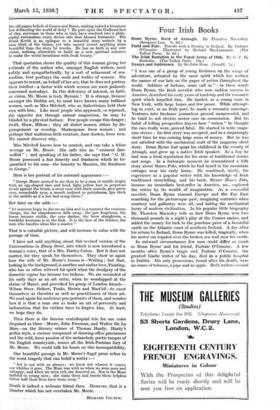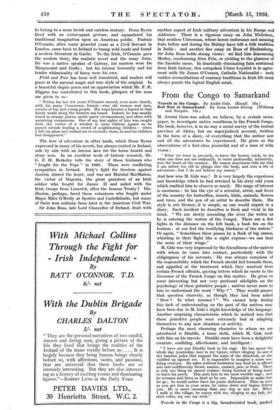Four Irish Books
Donn Byrne, Bard of Armagh. By Thurston Macauley. (Sampson Low. 7s. 6d. ) Essays and Addresses. By Sir John Ross. (Arnold. Os.) " I WAS one of a group of young Irishmen on the wings of adventure, actuated by the same spirit which has written the names of our lads on the pages of action throughout the world. Soldiers of fortune, some call us "—in these words Donn Byrne, the Irish novelist who won sudden success in America, described his early years of hardship and the romantic spirit which impelled him. He landed, as a young man, in New York, with large hopes and few pence. While attempt- ing to exist, as an Irish poet, he made a romantic marriage. Ventures into freelance journalism proved unsuccessful, and he tried to sell electric motor cars on commission. But his habit of telling prospective buyers how " rotten " he thought the cars really were, proved fatal. He started to write maga- zine stories : his first story was accepted, and in a surprisingly short time he was earning large sums of money. But he was not satisfied with the mechanical craft of the magazine short story. Donn Byrne had spent his childhood in the county of Armagh, and grew up a native Irish speaker. As a boy he had won a local reputation for his store of traditional stories and songs. In a fortunate moment he remembered a folk story about Marco Polo, which he had heard in the mountain cottages near his early home. He combined, nicely, his experience as a popular writer with his knowledge of Irish traditional storytelling, and his book, Messer Marco Polo, became an immediate best-seller in America, ant. captured the critics by its wealth of imagination. As a successful novelist, Donn Byrne roamed Europe and the Far East searching for the picturesque past, imagining centuries when courtesy and gallantry were all, and hating the mechanical hurry of modern civilization. In his popular little biography Mr. Thurston Macauley tells us how Donn Byrne won two thousand pounds in a night's play at the Cannes casino, and added the money for luck to the purchase price of a beautiful castle on the Atlantic coast of southern Ireland. A day after his return to Ireland, Donn Byrne was killed, tragically, when his motor car toppled over the broken sea wall near his castle.
In outward circumstances few men could differ so much as Dorm Byrne and his friend, Padraic O'Conaire. A few months after Byrne's tragic end, Padraic. O'Conaire, the greatest Gaelic writer of his day, died in a public hospital in Dublin. His only possessions, found after his death, were an ounce of tobacco, a pipe and an apple. Both writers seemed to belong to a more lavish and careless century. Donn Byrne lived with an extravagant gesture, and squandered his traditional imagination upon an American public. Padraic O'Conaire, after many peaceful years as a Civil Servant in London, came back to Ireland to tramp wild roads and found a modern literature in Gaelic. To the Irish, O'Conaire gave the modern story, the realistic novel and the essay form. He was a native speaker of Galway, his masters were De Maupassant and Gorki ; but his intense humanity and his tender whimsicality of fancy were his own.
Field and Fair has been well translated, and readers will guess at the natural magic and rare style of the original. In a beautiful elegiac poem and an appreciation which Mr. F. R. Higgins_ has contributed to this book, glimpses of the man are given to us : ," Within his last few years O'Conaire moved, even more closely, with his many Connemara friends—wise old women and men, cronies of his, and young people. His ways became a legend in that lonely world along the western sea-board. Indeed, he was usually found in strange places, under queer circumstances, and often with surprising companions. One of my last sights of him was caught from the corner of a window in some Galway square as he paSsed outside leading a crowd of neighbouring children : when I left my glass and rushed out to overtake them, he and the children had disappeared."
The love of adventure in other lands, which Donn Byrne expressed in many of his novels, has always existed in Ireland, side by side with an intense love for the home hearth and stony acre. In an excellent work of historic research, Mr. G. F. H. Berkeley tells the story of those Irishmen who " fought for the Pope " in 1860. There were conflicting sympathies in Ireland. Italy's fight for freedom against Austria stirred the heart, and was not Marshal MacMahon, the victor of Magenta, the great grandson of an Irish soldier who fought for James II and sailed with the Irish troops from Limerick, after the famous Treaty ? Dis- illusion, perhaps, faced those volunteers who fought under Major Miles O'Reilly at Spoleto and Castelfidardo, but many of them won military fame later in the American Civil War.
Sir John Ross, late Lord Chancellor of Ireland, deals with
another aspect of Irish military adventure in his Essays and Addrthses. There is a vigorous essay On John Nicholson, that reckless Ulsterman, whose heroic endurance and amazing feats before and during the Mutiny have left a folk tradition in India : and another fine essay on Ross of Bladensburg. Sir John Ross holds strong views.: we find him denouncing Morley, condemning Sinn Fein, or yielding to the glamour of the Jacobite cause. In drastically eliminating false sentiment from Irish history, thiS outspoken Ulster Loyalist is in agree. ment with Sir James O'Connor, Catholic Nationalist : such sudden reconciliations of contrary traditions in Irish life must always puzzle the logical English mind.





















































 Previous page
Previous page